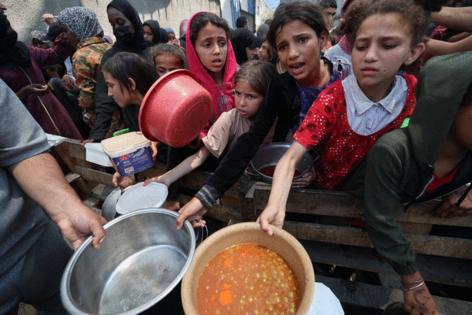Israel-backed Gaza aid group suspends operations for second day
Published in News & Features
An Israel- and U.S.-backed mechanism to distribute food in Gaza suspended operations for a day and a half following a series of deadly incidents near its sites that drew international criticism.
The Gaza Humanitarian Foundation, a Swiss-based nonprofit, launched in Gaza last week following a months-long Israeli blockade of the territory, and says it has handed out enough food staples for millions of meals. But the roll-out has been dogged by overcrowding and at least one incident in which Israeli forces, citing a security threat, fired toward Palestinians headed to a GHF aid center.
Rejecting criticism, it said on Thursday afternoon it had reopened two centers after improving security, and would continue to do its job. Criticism of the group has been severe.
“The world is watching, day after day, horrifying scenes of Palestinians being shot, wounded or killed in Gaza while simply trying to eat,” Tom Fletcher, the U.N. humanitarian affairs chief, said in a statement urging Israel to allow his organization’s aid network back into the territory. “We must be allowed to do our jobs: We have the teams, the plan, the supplies and the experience.”
U.N. Secretary General Antonio Guterres on Monday called for an independent investigation into reports that Israeli forces had killed dozens near the aid stations in Rafah. The Israeli army denied that its soldiers had shot anyone seeking aid and the GHF called the reports “outright fabrications.” In a statement on June 2, the International Committee of the Red Cross said its hospital had received 21 dead among 179 casualties.
The stations were shuttered on Wednesday and Thursday morning “due to ongoing maintenance and repair work,” the GHF said in a statement.
The upheaval coincided with furor over Israeli media reports that a local militia was helping secure the GHF in southern Gaza. According to public broadcaster Kan, Israel supplied the militia with assault rifles. While declining to respond directly, Prime Minister Benjamin Netanyahu’s office said in a statement: “Israel is acting to defeat Hamas in various ways upon the recommendation of the heads of the security establishment.”
Gaza’s 2 million Palestinians had long depended on U.N. relief before the Oct 7, 2023 Hamas attack that killed 1,200 people. During the almost 20-month-old war — in which more than 54,000 Palestinians have been killed, according to the Hamas-run health ministry — U.N. agencies have been sidelined by Israel, which accuses them of being too close to the U.S.-designated terrorist group.
Some of Israel’s closest European allies, including Germany, the U.K. and France, have grown increasingly critical of Israel’s prosecution of the war, which has destroyed much of the coastal strip and sparked what international aid agencies say is a hunger crisis. They’re considering trade sanctions and curbs on arms sales to push Israel to end the war.
The U.N. has criticized the GHF for not being able to provide anywhere near enough food and medicine for Gaza’s population and for politicizing humanitarian work. Israel, which controls Gaza’s borders, argues that Hamas benefits from siphoning off U.N. aid.
“There is a joint effort here, both by Hamas and by the U.N., which want to see the failure of these distribution centers,” Danny Danon, Israel’s ambassador to the U.N., said in an Army Radio interview on Thursday.
___
©2025 Bloomberg L.P. Visit bloomberg.com. Distributed by Tribune Content Agency, LLC.







Comments